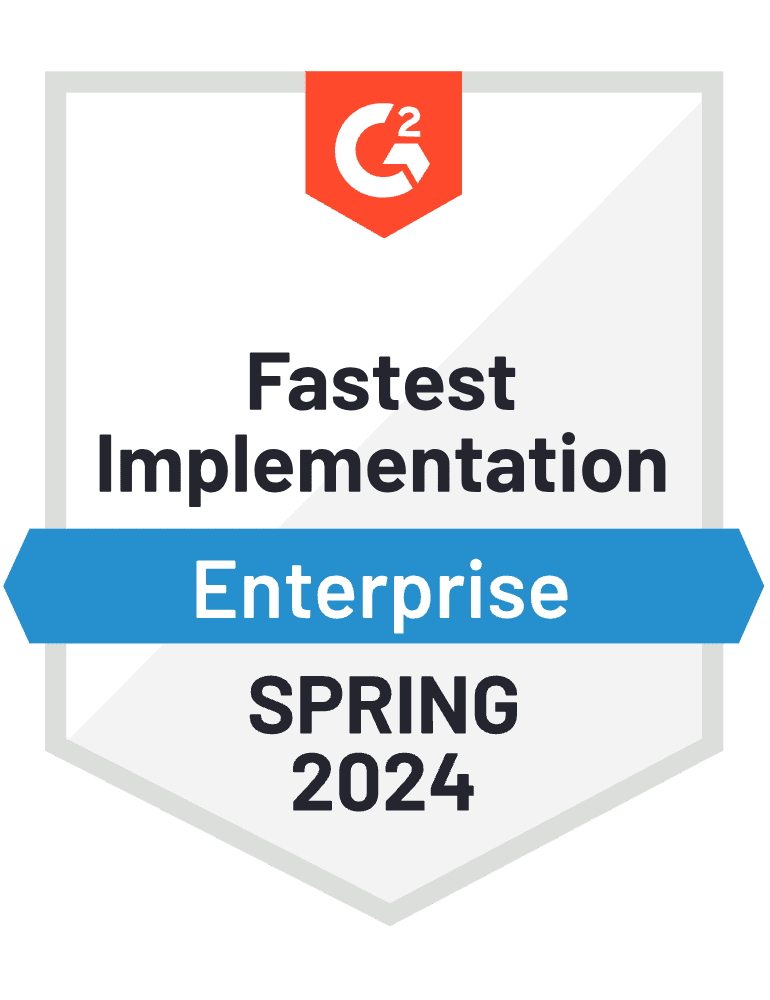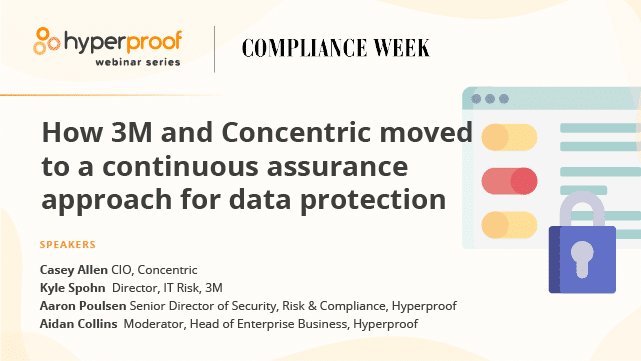AI Driven by Human Expertise: Hyperproof’s Bold Hybrid Approach to AI in GRC

Throughout 2024, artificial intelligence (AI) has steadily revealed its potential to revolutionize industries. AI presents a particularly attractive use case in the evolving world of Governance, Risk, and Compliance (GRC).
At Hyperproof, we believe organizations must move deliberately but need to avoid AI impulsiveness. In doing so, our strategy has been carefully crafted to empower customers to be more efficient, while ensuring their data and privacy are kept safe. This approach leverages the synergies between AI and human expertise to elevate our services and offer exceptional value to our customers.
Recognizing AI’s promise and boundaries

AI’s potential to revolutionize GRC is indisputable. Its ability to analyze data, provide predictive insights, and streamline compliance processes is groundbreaking. We recognize the imperative to exercise substantial responsibility in handling this technology – always remembering that too much salt spoils the soup.
Our CEO, Craig Unger, has this to say on the topic:
We are navigating a transformative era in GRC management. The powerful combination of AI and human insight is a great differentiator for navigating complex regulations and ethical nuances. We have been early adopters in using AI — particularly with our crosswalking feature, Jumpstart — while safely adding a depth of human oversight that allows customers to proceed with confidence.
Craig Unger, CEO and Founder of Hyperproof
Hyperproof’s approach to AI
Hyperproof’s approach to AI is deeply rooted in a philosophy of thoughtful integration and innovation. Today, we leverage an extensively trained AI model to continuously deliver deeply integrated frameworks at a faster pace than anyone else in the market. We’ve developed a unique generative AI model, powered by OpenAI, to tailor precise, industry-specific controls to enhance frameworks and regulations for the specific workflows that compliance managers execute. These innovations lead to smarter and more efficient GRC processes built on a foundation of human oversight and trust.
Furthermore, Hyperproof supports both the NIST AI RMF (Risk Management Framework) and ISO 42001 AI Management System, demonstrating our commitment to adhering to the highest standards in AI governance and responsible management.
Additionally, we’re exploring the following areas for AI innovations:
Streamlining compliance operations
AI can significantly enhance the efficiency of compliance operations by automating the monitoring and analysis of regulatory updates and compliance controls. In sectors like finance and healthcare where organizations may receive hundreds of regulatory alerts daily, AI can help them stay current with obligations and proactively address compliance issues.
Intelligent recommendations and support
AI applications can improve how users interact with GRC solutions by providing smart recommendations for controls, crosswalks, and policies, and offering support through an AI chatbot. These tools help with matching controls to standard guidelines and providing intelligent, context-aware support to users, streamlining the decision-making process.
Enhanced evidence and audit management
AI applications can revolutionize the way organizations handle compliance evidence and audits. These tools allow for automated review and analysis of provided proof, suggesting appropriate controls and assessing audit preparedness to optimize the compliance process and ensure you’re always ready for an audit.
Risk assessment and management
AI’s capability to quickly identify unusual data patterns, outliers, or gaps in compliance is vital for early detection of potential risks. New applications could flag risks based on trends, enabling organizations to resolve issues and proactively prevent breaches and penalties.
Tailored training and incident simulation
AI could deliver customized training based on specific role requirements, ensuring personnel are well-equipped to handle compliance-related tasks. Additionally, AI can simulate various security incidents, providing organizations with insights into potential risk impacts and enhancing their preparedness for real-world scenarios.
Beyond the frontier: understanding AI’s limitations

Even as artificial intelligence brings promising developments to the GRC space, addressing its current challenges is equally essential. Recognizing these limitations helps us to implement AI in GRC thoughtfully and with careful anticipation.
While our AI journey began well before the recent Gen AI surge, experience has taught us to recognize both its boundless potential and its current boundaries. Our strategy at Hyperproof is to maintain a bold fusion of AI’s technological prowess and the critical touch of human expertise, crafting solutions that are both revolutionary and unwaveringly trustworthy.
Craig Unger, CEO and Founder of Hyperproof
We acknowledge challenges such as AI’s understanding of complex regulatory texts, data quality dependencies, and the necessity for human oversight in decision-making, especially concerning ethical and bias concerns. However, these are not roadblocks; they are stepping stones guiding our journey in integrating AI into GRC responsibly. A few notable AI limitations include:
Understanding context and nuance
AI, at its current stage, often struggles with interpreting the context and nuances of complex regulatory texts. Unlike human experts, AI may not fully grasp the subtleties of legal language and ethical considerations.
Dependence on data quality
AI’s effectiveness is heavily reliant on the quality of data it processes. Inaccuracies in data can lead to flawed insights and decisions, making data verification by human experts essential.
AI hallucinations
AI can generate unreliable or inaccurate content, a problem for the high precision demands in GRC. Once this issue is resolved, the use of AI in GRC will broaden. As such, we are continuing to monitor and test this behavior to bring new AI capabilities to market as soon as possible.
Limited decision-making capabilities
While AI can assist in decision-making by providing data-driven insights, it lacks the human ability to make nuanced judgments, especially in complex and unprecedented situations.
Ethical and bias concerns
AI systems can inherit biases present in their training data, leading to ethical concerns, especially in sensitive areas like risk assessment and fraud detection.
Regulatory and compliance challenges
The dynamic nature of GRC regulations poses a challenge for AI systems to stay current without constant updates. Ensuring AI compliance with evolving legal standards is an ongoing concern.
A vision for AI in harmony with human expertise

Peering into the future, we envision a GRC world transformed by AI – not as an intruder but as a powerful ally to human insight. We are excited to be crafting AI solutions that don’t just support but elevate human decisions, melding cutting-edge innovation with unwavering safety. In a tech-driven market, we are excited to present our bold vision of AI and human expertise, which we believe is the best approach to balance both our commitment to operational efficiency and reliability. Our promise is one of relentless innovation, built on a foundation of ethical integrity, proactive foresight, and a steadfast dedication to technology that puts people first.
See Hyperproof in Action
Related Resources
Ready to see
Hyperproof in action?












